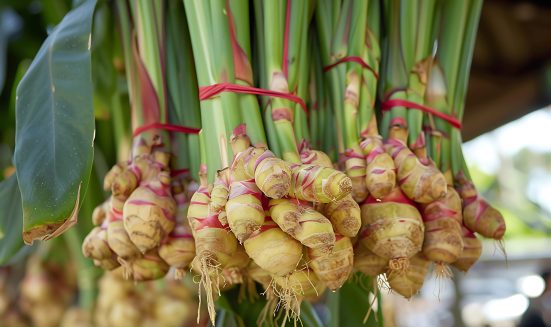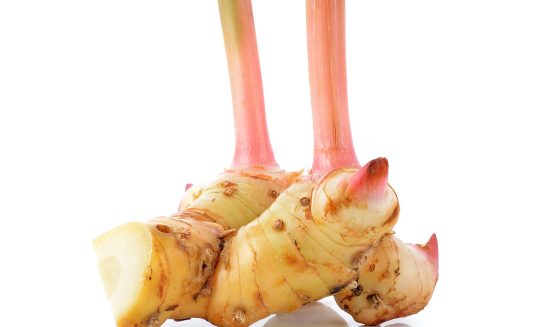

Historically, Alpinia galanga has been used in Ayurvedic medicine (a form of Hindu traditional medicine that dates back more than 5,000 years). It has been widely used for anti-inflammatory activities, where its rhizomes are used to combat diseases like heart disease, diabetes, hypertension, asthma, ulcers, microbial infections, etc. A. galanga is rich in different types of phenolic compounds and essential oils, whereas A. officinarum (lesser ginger) is rich in flavonoids and diarylheptanoids. The predominant phenolic substance in A. galanga is 1′S-1′-acetoxychavicol acetate, which is known as the source of A. galanga’s unique pungent flavor and fragrance.
Its medicinal and pharmacological properties are attributed to its numerous bioactive components. Galangin, a flavonol, is an example of this and is anti-inflammatory, antioxidant, and immunomodulatory. Studies have shown that galangin has the potential to help treat a range of diseases like neurodegenerative, cardiovascular, and cerebrovascular diseases, and even diabetes and arthritis. Similarly, it has also shown some potential in combating cancer cells, but further confirmation is still needed to determine exactly what it inhibits. This opens a new alternative and perspective to conventional drugs/treatments that may have side effects.
Alpinia galanga contains bioactive compounds, including flavonoids and phenolics, that have strong anti-inflammatory effects. These compounds can help reduce inflammation in the body, making it useful for treating conditions like arthritis and other inflammatory diseases.
Relieves Digestive Discomfort, like other members of the ginger family, Alpinia galanga is effective for treating digestive issues such as bloating, indigestion, and stomach cramps. It stimulates the production of bile and gastric juices, which aid digestion.
The plant contains powerful antioxidants like flavonoids and essential oils, which help neutralize free radicals in the body. This reduces oxidative stress and lowers the risk of chronic diseases such as heart disease, cancer, and premature aging.
Alpinia galanga has shown promising antimicrobial and antifungal effects in laboratory studies. It is effective against various harmful microorganisms, including bacteria and fungi.
The anti-inflammatory compounds in Alpinia galanga can also act as natural pain relievers. It has been used for headaches and muscle pain.
Some studies have suggested that Alpinia galanga may have anticancer effects. The galangin compound found in the plant has shown potential in inhibiting the growth of cancer cells in laboratory studies, particularly in lung, breast, and colorectal cancer. It’s thought that the antioxidant and anti-inflammatory compounds play a key role in reducing cancer risk, but more research is needed to confirm this
If you have any question, don’t hesitate to contact us!
Copyright © 2024 Sow & Tell Indonesia | All Rights Reserved | Terms and Conditions